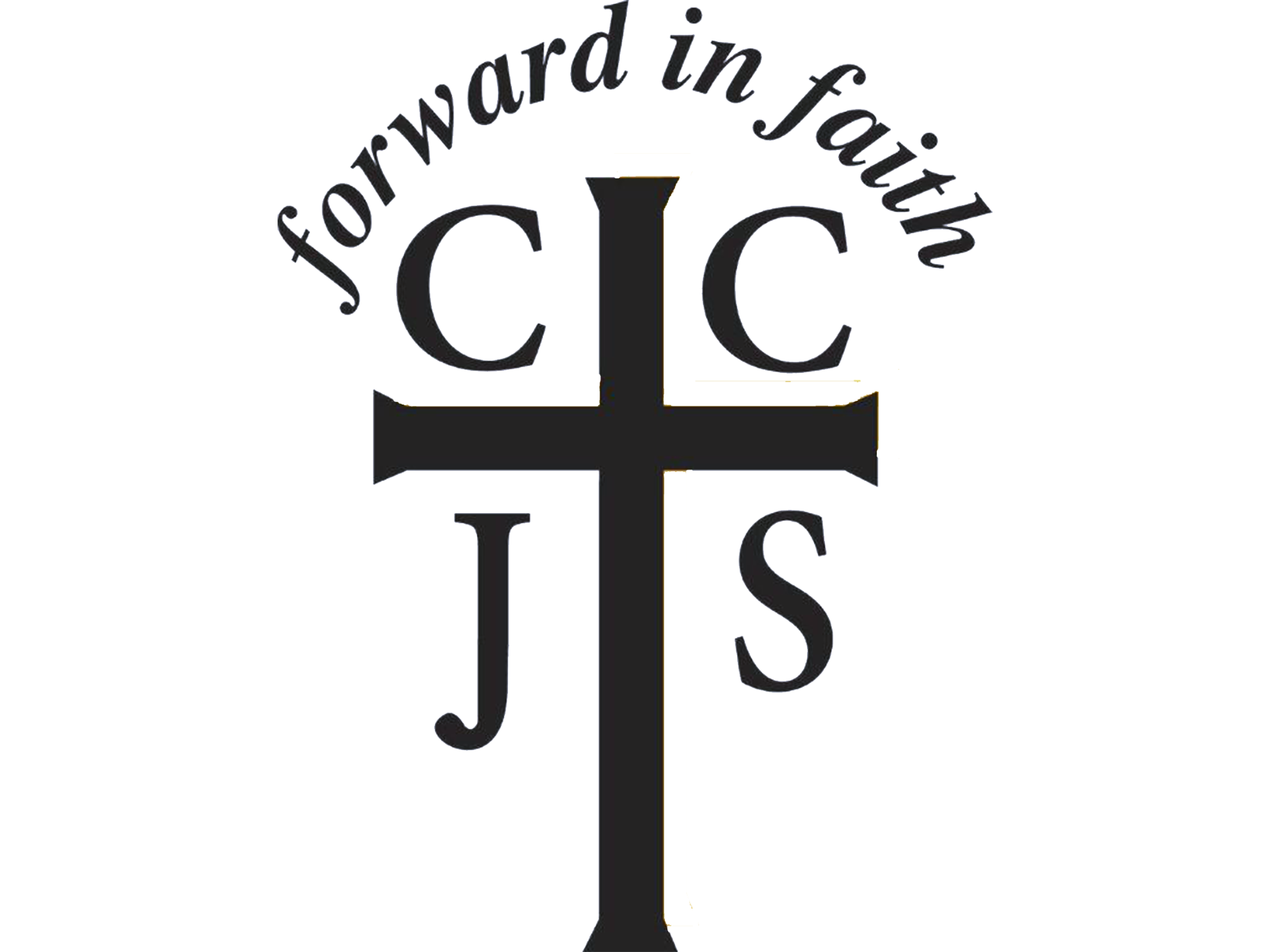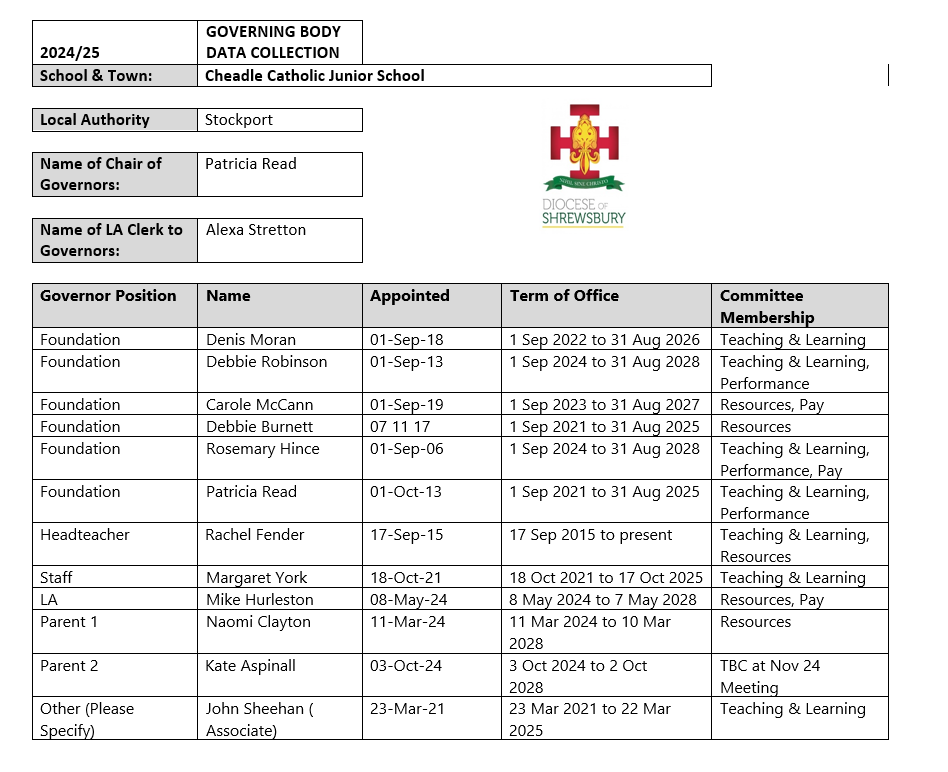
Cheadle Catholic Junior School
Governing Board
Cheadle Catholic Junior School is a Voluntary Aided school and its Governing Board consists of both appointed and elected governors.

Governors generally hold office for a period of four years at a time. During their term, they are encouraged to attend training courses and workshops on a comprehensive range of topics provided by the Local Authority and the Diocese and they receive updates on salient issues from a variety of sources.
Meetings: The Full Governing Body meets officially once per term. There are also various sub-committees. The Teaching and Learning Committee and Resources Committee officially meet termly, although the Resources Committee have additional meetings to approve the budget and to ensure best practice is being followed in managing the school finances.
Foundation Governors:
Foundation Governors at the school represent the interests of the Diocese of Shrewsbury. The role of the Foundation Governor is to ensure that the school is clearly recognisable as Christian in its ethos and that its role is seen in the provision for Catholic children of the Diocese.
Our Foundation Governors are: Mrs Patricia Read, Mr Denis Moran, Mr Paul Kirrane, Mrs Rosemary Hince, Mrs Debbie Robinson and Mrs Debbie Burnett.
Local Authority Governor:
Each Governing Body has one Governor representing the Local Authority.
Our LA Governor is Mr Michael Thurston.
Parent Governor:
Parents of pupils registered at the school are eligible to stand for election as one of the two Parent Governors. They are elected by other parents at the school.
The current Parent Governors are: Ms Naomi Clayton and Mrs Katie Aspinall
Staff Governors:
The Headteacher is automatically eligible to be a full member of the Governing Body by virtue of the office. Both teaching and support staff who are paid at the school are eligible to stand as the staff governor. This person is elected by other members of the staff at the school.
The current Staff Governor is Mrs Margaret York.
Associate Governors:
Under Reconstitution, Governing Boards may also have a number of Associate Governors. Whilst it has been agreed that these Governors have the right to vote at sub-committee level, they do not have a vote at the Full Governing Board meetings, nor are they required to attend them.
We currently have one Associate Governor: Mr John Sheehan (Deputy Headteacher).
School Governors - an overview
School Governors make a positive impact on the education of thousands of children and work towards better schools and a better community.
The Role
Anyone aged 18 or over and living in the UK can be a governor. All governors are volunteers. Governors do not manage a school day-to-day, but are required to oversee its long-term development. Governors are volunteers.
Ultimately, all governors responsibilities come back to this task and can be split into three core roles:
Support and Challenge
- Ensure accountability
- Asking the difficult questions and guaranteeing the school is responsible for its actions.
- A Champion of Success
- Using your skills and experience to support the school in achieving its aims and recognising good performance.
Providing Strategic Management
- Establish a Strategic framework
- Helping to set the school's aims and objectives.
- Monitor and Evaluate progress
- Analysing decisions: are they producing the desired results?
Making Executive Decisions
- Allocate and control the school budget
- From extra staff training to investing in new buildings or equipment.
- Appoint Senior Staff
- Including the responsibility of appointing a new Deputy Head or Headteacher.
Different Types of Governor
As a Voluntary Aided School, we have represetatives from all aspects of school life appointed on its Governing Body:
- Foundation Governors represent the Diocese and are appointed by the Bishop;
- Parent Governors who are elected by the parents;
- Staff Governors who are elected by the staff;
- Local Authority Governors who are elected by the LA.
Despite representing different groups, all governors have exactly the same role and voting rights.
The Governing Body of a Catholic School
All governors of Catholic maintained schools have legal rights and responsibilities to ensure that they safeguard and promote their school's denominational character. These rights and responsibilities have been recognised by the Government as central to the continuing success of Catholic Education.
Time Commitment
The average time commitment is 4-6 hours per month. This includes meetings, background reading and school visits. School Governors are like magistrates or members of a jury and therefore have a right to reasonable time off work for their public duties (this may be unpaid).
Term of Office
School governors have a term of office of four years. However, as a volunteer, they can resign if their circumstances change.
Training
Governing bodies rely on a variety of experiences and perspectives. No prior knowledge is required. Training and support is available for new and existing governors and is free of charge. All new governors attend a governor induction programme and all governors commit to some ongoing training in their new role.
What Skills does the Governing Body have?
Governors together should form a board which has all the skills needed to conduct the business as required, for example skills in education, data, curriculum areas, wellbeing, and pastoral support, finance, property management, HR and others. All governors have:
- An interest in education
- Enthusiasm and commitment
- A willingness to ask questions
- Being open to ideas and willing to learn
- Knowledge of the school community and local knowledge
- Any business or other skills you happen to have
Responsibility
Responsibility for actions and decisions lies with the governing body as a whole and not with individual members. However, the Governing Body as a whole bears statutory responsibilities and needs to remain alert and passionate about its essential role.
How does the Governing Body work?
The work of the Governing Body is undertaken through two committees - the Resources Committee and the Teaching and Learning Committee - and through full Governing Body meetings.
Steering meetings, consisting of the Headteacher and the Chair, Vice-Chair and Chairs of the sub-committees, help to ensure the work is focused on priority areas and also that all information and data is readily available for the committee and full Governing Body to monitor and evaluate.
Governors make visits to school in accordance with the Governor Visits Policy and this ensures their involvement with the daily life of the school. Many governors also have a 'link governors' role, where they will work more closely with staff on a designated area in line with the School Development Plan, inspections (Ofsted and Catholic Schools Inspection) and in taking emergency decisions, such as in relation to critical incidents.
Ongoing guidance, training and support is provided to the Governing Body by Stockport Local Authority and the Diocese of Shrewsbury.
Resources Committee
The Resources Committee has specific responsibility for matters relating to finance, human resources and premises, with further discussion and agreement made by the full Governing Body on a termly basis.
Responsibilities include; the school budget, annual review of expenditure and income, reviewing staff structure, pay, Continuing Professional Development and monitoring and managing premises, including safety checks, governors' responsibilities under the Environmental Protection Act 1990 and insurance agreements.
Teaching and Learning Committee
The Teaching and Learning Committee has specific responsibility for matters relating to the Catholic ethos and religious provision, the curriculum of the school and related school policies ensure the needs of children with Special Educational Needs and/or Disabilities (SEND) are met, review welfare/wellbeing matters, attendance and extra-curricular activities. There is then further discussion and agreement made by the full governing body on a termly basis.
Details of the structure and responsibilities of the governing body and each governor’s business interests, financial interests and governance roles in other schools are provided below.